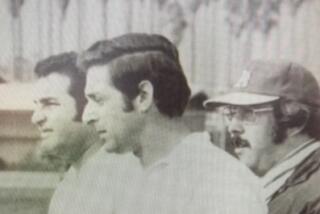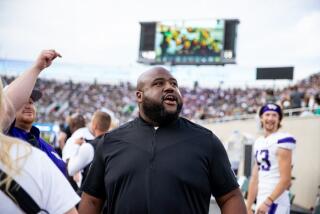A Bright Moon Continues to Rise : Oilers: He has been rejected and dejected, but now some are calling him the best quarterback in the National Football League.
- Share via
Quarterback Warren Moon of the Houston Oilers drops back to pass and is immediately assaulted by the Cincinnati Bengals’ defense. It looks as if he will be sacked.
But wait.
Moon escapes the grasp of a defender and runs 10 yards for a first down.
Then, facing a blitz, Moon rolls left and throws right, a perfect strike to Drew Hill, just before being engulfed by defenders.
On the Oilers’ next possession, Moon surveys the field after taking the snap. Seeing his primary receiver covered, he drills another pass to Hill, putting the Oilers in position to score.
Moon then fires a touchdown pass to Ernest Givins.
Moon is having his best season since coming to the Oilers from the Edmonton Eskimos of the Canadian Football League in 1984. He is No. 1 on the roster and No. 1 in the hearts of Oiler faithful.
With a 91.7 quarterback ranking, third best in the AFC behind Jim Kelly of Buffalo and Boomer Esiason of Cincinnati, Moon has passed for 2,453 yards and 15 touchdowns. He has thrown for more than 200 yards in eight of his last nine games going into Sunday’s matchup against the Raiders in Houston.
Oiler Coach Jerry Glanville said this week: “He’s more than a quarterback. He’s more than a passer. We ought to put a new title in the program for him. He does it all.”
Although Randall Cunningham of the Philadelphia Eagles is hailed as the new prototype quarterback, Moon has quietly eclipsed him.
Is Moon competing statistically against Cunningham?
“Not really,” Moon said. “For one, we’re in different conferences and we never play against each other. I’m happy for whatever success he’s having. I’m happy for whatever success any (other) black quarterbacks have because it’s only going to help out all the younger guys coming along.”
As one of the NFL’s pioneer black quarterbacks, does Moon feel accepted now?
“I think I’ve been accepted pretty well throughout the league,” Moon said. “As I improved, you started not to hear the word black put in front of quarterback all the time. And now I’m pretty much recognized as just another quarterback in the league.”
Moon, however, wasn’t even drafted when he left the University of Washington in 1978. There’s no way that could happen in today’s enlightened age, right?
“I’m not sure,” Moon said. “Rodney Peete should have been a top pick in the draft. He had everything going for him that you need coming out of (USC). He was a winner. He’s got smarts. He’s got a good arm. He might not have been as tall as a lot of people might like, but he’s tall enough. You’ve got other quarterbacks who went higher than he did who are not as tall.
“The thing that I’m more disappointed in, in the NFL (attitude) about black quarterbacks, is that if you’re not a guy who they think can come out of college and play right now, most teams aren’t willing to put the time into you to groom you for the future.”
By the time Moon entered the game, Hamilton High’s B team had a 40-point lead.
The third-string quarterback launched an 80-yard pass, overthrowing his receiver but impressing Jack Epstein, then the Hamilton varsity coach, who was watching from the stands.
“I’ll remember that pass until the day I die,” Epstein said. “He was just a little skinny kid and he threw that ball so hard there was smoke coming off the back of the ball. The ball went about a mile over the receiver’s head.”
Epstein approached Moon after the game.
“I told him that he was going to be the quarterback on the varsity next year,” Epstein said. “His chest puffed out and his eyes got big as hell.”
After taking over as varsity quarterback, Moon led Hamilton to the 1973 City playoffs as a senior and was named to the All-City team.
But recruiters weren’t interested in him because he was only 5-11 and 165 pounds.
“I tried to sell UCLA on him, but they were running the option and they thought he was too small,” Epstein said.
After Epstein left to become offensive coordinator at West Los Angeles College, Moon followed.
Moon flourished at West L.A. where he was named the Western State Conference player of the year as a freshman.
He came to the attention of Washington Coach Don James, but he was reluctant to recruit him.
“I said there was no way that we were going to ever take a freshman out of junior college unless we got absolute permission to recruit him,” James said. Epstein gave his permission, and the Huskies signed Moon.
Although Moon was apprehensive about attending a college that had racial tension on its football team under the previous coach, Jim Owens, Epstein assured him that it would be different under James.
One Saturday in Seattle, Moon was serenaded with boos as soon as he emerged from the tunnel at Husky Stadium. The booing became so loud that it drowned out his signals.
Washington fans jeered Moon with racial slurs. They were angry with him because the team was stumbling to a 5-6 record in his second season as the starting quarterback.
“There’s always a big question whether they were booing the guy because he was the quarterback and we weren’t winning, or whether they were booing him because he was black,” James said. “I’m sure they were tough times for Warren to go through. But we tried to tell him constantly that it had nothing to do with race, that it was football USA and it happens in every town.
“I’m sure it did bother him. It was really grim at times. But Warren was a real gentleman. He didn’t lash out at any of the fans publicly. He took everything he got and he turned around and got more determined to prove that he was a good quarterback.”
Was Moon disturbed by the booing?
“Definitely,” he said. “When you’re 18 and you’ve never been away from home and suddenly 60,000 people are booing you and blaming the whole football game on you, it’s quite a shock. But I learned a lot from that experience, and because it happened to me at such a young age, I think I learned how to deal with adversity as I got older.”
After the Huskies started 2-2 in 1977, James stuck with Moon despite the calls for him to change quarterbacks.
The move paid off as Moon led the Huskies to the conference championship and a win over Michigan in the 1978 Rose Bowl game.
Moon was named the Pacific 8 player of the year after passing for 1,584 yards and 11 touchdowns as a senior. He passed for 3,277 yards and 19 touchdowns in his collegiate career.
Although Moon managed to win over Washington’s fans, he failed to win over skeptical NFL scouts.
Moon headed north, signing with the Edmonton Eskimos of the Canadian Football League before the ’78 NFL draft.
“The stereotype was that he was a black quarterback and he was going to run around like a madman, but he wouldn’t be able to throw very well,” said Edmonton General Manager Hugh Campbell, who coached Moon for five years in Edmonton and two in Houston.
Moon, however, did not fit the stereotype. He passed for 21,228 yards in his six CFL seasons, and the Eskimos won five consecutive Grey Cup championships.
“The time he spent in Edmonton was important,” Campbell said. “If he’d gone straight to the NFL, it might have been a different story, not as happy a story and not as financially rewarding.”
Moon was rewarded when he went to the NFL in 1984, becoming the league’s highest-paid quarterback with a $5.5-million, five-year contract. He signed a new $10-million, five-year contract last April.
With the Seattle Seahawks also trying to sign Moon in ‘84, the Oilers hired Campbell to coach the team because they thought Moon would follow him. And they were right.
“When Warren came to Houston, there was no question in any of our minds that he was one of the top 10 quarterbacks in the NFL,” Campbell said. “We just didn’t have the players to go with him.”
The Oilers struggled in Moon’s first two seasons, compiling an 8-24 record, and Campbell was fired with two games left in the 1985 season.
Campbell said the Oilers “deceitfully misled” him, hiring him because of his relationship with Moon and not on his own merits.
Moon said: “When Hugh got fired, I was really down and out because . . . I was told before I got here that he would be given three years to help build this team. He was cleaning house of a lot of old players and bringing in a lot of new players. We didn’t have a whole lot of talent when I first got here, and it seemed like they wanted things to happen a little bit quicker than (in a) three-year plan.
“I didn’t know where I fit into those plans once he got fired because a lot of what we were going to try and do were things we had done before in Canada.”
Moon clashed with Glanville, who succeeded Campbell. The quarterback wanted to pass, and the coach wanted to run.
“Jerry came in with his own philosophy, and I didn’t think I fit into that philosophy,” Moon said. “I was very unhappy for about a year and a half here because I felt like I was just handing the football off and not really being taken advantage of, as far as my skills were concerned.
“But we sat down at the end of his first year and had a talk about offensive philosophy and how I fit into what we were doing, and we opened up from that point on.”
Moon has thrown for 8,622 yards and 51 touchdowns in his last three seasons.
Campbell said: “I’m a great fan of (San Francisco 49er quarterback) Joe Montana and I’m not trying to say anything sacrilegious, but I believe that Warren is the absolute best.”
It helped that the Oilers let Moon call his own plays. Perhaps no other quarterback in the NFL calls more plays than Moon. But winning his freedom from Glanville’s conservative play-calling wasn’t easy.
Moon criticized Glanville for calling too many running plays after the Oilers got off to a 1-8 start in 1986. Glanville responded by turning over the offense to Moon, and Houston won four of its last seven games.
The Oilers have finished second in the AFC Central Division the last two seasons but have been eliminated in the divisional playoffs, a trend they hope to halt this time around.
More to Read
Go beyond the scoreboard
Get the latest on L.A.'s teams in the daily Sports Report newsletter.
You may occasionally receive promotional content from the Los Angeles Times.










